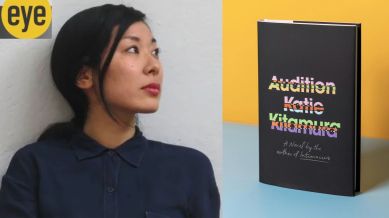Booker Prize 2025: Katie Kitamura’s Audition turns life into a stage
Katie Kitamura's Audition blurs the line between life and performance, turning self-recognition into the novel’s most unsettling illusion

In Audition, Katie Kitamura’s fifth novel, the stage is both literal and psychological. Her earlier novels – A Separation (2017) and Intimacies (2021) – were peopled by narrators who interpret, translate, and observe the words and emotions of others.
The Booker-shortlisted Audition takes the next logical step: the unnamed protagonist, a middle-aged actress, no longer interprets; she performs. And the performance, Kitamura suggests, may be all there is.
The setup is deceptively simple. The protagonist is married to Tomas, an art critic of impeccable taste and glacial affect. They share an apartment, a rhythm of professional success and emotional ambivalence. The narrator is rehearsing a minimalist play she can’t fully grasp, a role she can’t quite inhabit.
Then a young man, Xavier, appears, claiming to be her son. The assertion is at once absurd and plausible. From this encounter, Kitamura builds a bifurcated narrative. In the first half, the actress insists she has never given birth. In the second, she inhabits a parallel reality in which Xavier could well be her child. The split is never explained. Instead, the novel inhabits the fracture – two selves, two fictions, uneasily superimposed.
Conceit and choreography
Performance has long been Kitamura’s chosen terrain. If Audition literalises the conceit, it also echoes the social choreography of daily life. Every meeting, every conversation, every marriage, the book suggests, demands its own script.
Kitamura writes with the precision of a camera trained on a single, unblinking face. Her prose is pared back – sentences cut clean as glass, dialogue are stripped of ornament. The effect is claustrophobic, hypnotic and unsettling. Every gesture becomes a signal; every pause in dialogue hums with meaning. Her narrator observes herself with the practised precision of an actress invested in the art of representation: “More and more often, I was surprised by the person in the mirror, it was not the lines at my mouth or the hollowness around my eyes, it was the lag in recognition that was the most troubling, the brief moment when I looked in the mirror and did not know who I was.” That self-consciousness becomes the book’s pulse.
Kitamura’s other preoccupation has been with mediation — how language, interpretation and performance both connect and estrange us. In A Separation, a translator travels to Greece in search of her estranged husband; in Intimacies, an interpreter at The Hague becomes entangled in the opaque moral terrain of an international trial. Both novels explore the ethics of representation: what happens when words stand in for experience, or when neutrality itself becomes a kind of performance.
Where A Separation and Intimacies work within a tautly realist framework, Audition breaks the frame altogether. As the divide between the stage and the world blurs, the self refracts into multiple, incompatible versions. Kitamura’s touch is so measured that the reader experiences the disorientation gradually, like a shift in lighting one only notices after it has changed the entire room. The style recalls Joan Didion’s essays on New York, their poise concealing unease, the sense of a woman parsing the noise of the city as the proscenium, observing its manners with both fascination and fatigue.
The menace of minimalism
At its best, Audition’s minimalism becomes a kind of menace. Kitamura’s restraint amplifies the smallest details: the hesitation before a line is spoken, the difference between recollection and script. But this is also the book’s biggest risk. Audition can feel airless, its intellectual poise verging on chill. Kitamura’s refusal to resolve the dissonances she creates frustrates expectations of any narrative closure. The questions — Is Xavier her son? Is Tomas unfaithful? Was the whole thing a rehearsal for something else entirely? — remain suspended. Kitamura isn’t interested in revelation but in the charged stillness of the stage just before the lights go on.
Audition is a profoundly urban novel in its mood of composed anxiety, its fascination with appearances and the labour of maintaining them, its quiet dread over the erosion of identity that comes with middle age, particularly for those whose professional lives are built on visibility. It captures the city’s unspoken truth: that to live here is to act, endlessly — to project competence, allure, indifference, until the role becomes indistinguishable from the self.
Audition
Katie Kitamura
Fern Press
197 pages
Rs 999